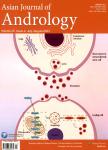Change of the cell cycle after flutamide treatment in prostate cancer cells and its molecular mechanism
Change of the cell cycle after flutamide treatment in prostate cancer cells and its molecular mechanism作者机构:Department of Urology Tangdu Hospital Department of Urology Department of Microbiology Department of Epidemiology Department of Nephrology Xijing Hospital Fourth Military Medical University Xi'an 710032 Shaanxi China
出 版 物:《Asian Journal of Andrology》 (亚洲男性学杂志(英文版))
年 卷 期:2005年第7卷第4期
页 面:375-380,页
核心收录:
学科分类:1002[医学-临床医学] 100214[医学-肿瘤学] 10[医学]
基 金:This project was granted by the National Nature Science Foundation of China(No.30100185)
主 题:prostate cancer LNCaP p21 androgen receptor CDKN1A BTG1 cell cycle genes flutamide
摘 要:Aim: To explore the effect of androgen receptor (AR) on the expression of the cell cycle-related genes, such as CDKNIA and BTG1, in prostate cancer cell line LNCaP. Methods: After AR antagonist flutamide treatment and confirmation of its effect by phase contrast microscope and flow cytometry, the differential expression of the cell cycle-related genes was analyzed by a cDNA microarray. The flutamide treated cells were set as the experimental group and the LNCaP cells as the control. We labeled cDNA probes of the experimental group and control group with Cy5 and Cy3 dyes, respectively, through reverse transcription. Then we hybridized the cDNA probes with cDNA microarrays, which contained 8 126 unique human cDNA sequences and the chip was scanned to get the fluorescent values of Cy5 and Cy3 on each spot. After primary analysis, reverse transcription polymerase chain reaction (RT- PCR) tests were carried out to confirm the results of the chips. Results:After AR antagonist flutamide treatment, three hundred and twenty-six genes (3.93 %) expressed differentially, 97 down-regulated and 219 up-regulated. Among them, eight up-regulated genes might be cell cycle-related, namely CDCIO, NRAS, BTG1, Wee1, CLK3, DKFZP564A122, CDKNIA and BTG2. The CDKNIA and BTG1 gene mRNA expression was confirmed to be higher in the experimental group by RT-PCR, while p53 mRNA expression had no significant changes. Conclusion: Flutamide treatment might up-regulate CDKN1A and BTG1 expression in prostate cancer cells. The protein expressions of CDKN1A and BTG1 play an important role in inhibiting the proliferation of cancer cells. CDKN1A has a great impact on the cell cycle of prostate cancer cells and may play a role in the cancer cells in a p53-independent pathway. The prostate cancer cells might affect the cell cycle-related genes by activating AR and thus break the cell cycle control.



